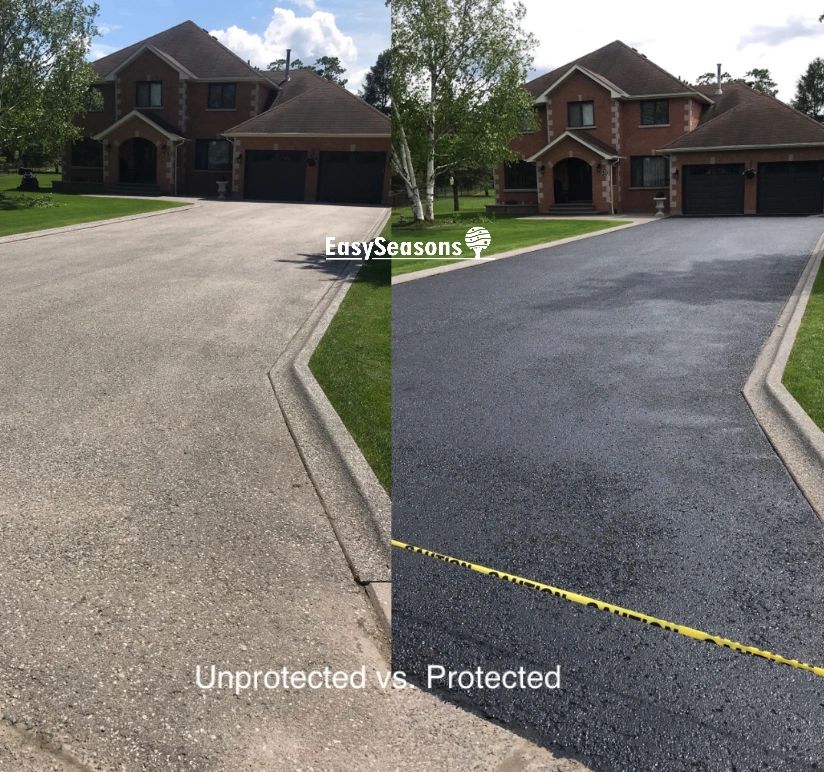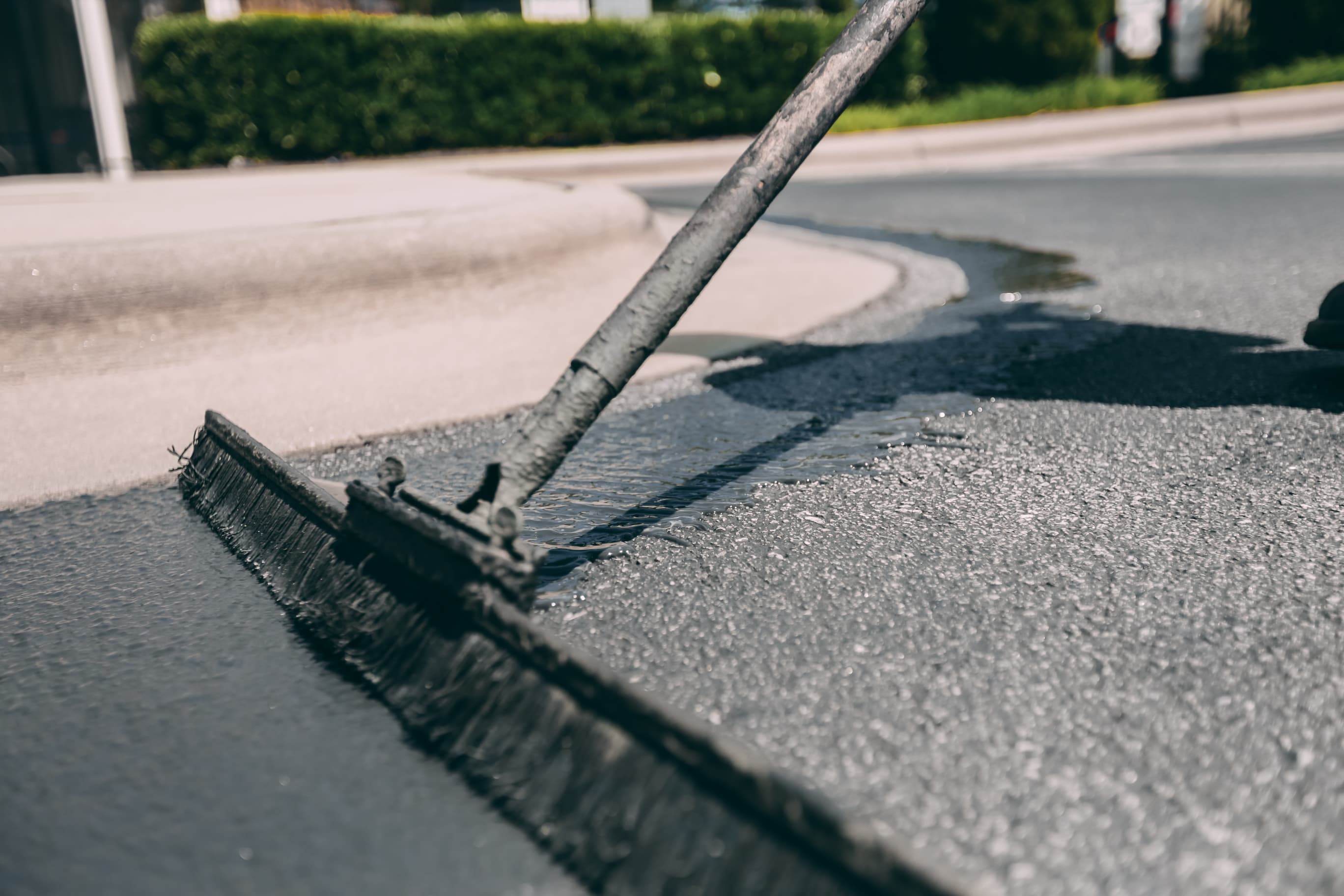Grasping Tilted Parking: How Asphalt Sealing Boosts Business Lots
Grasping Tilted Parking: How Asphalt Sealing Boosts Business Lots
Blog Article
Warm Mix Asphalt: A Lasting Service for Sidewalk
Hot Mix Asphalt (HMA) has emerged as a leading lasting option for pavement options, offering a myriad of innovative technologies and ecological benefits. As the demand for eco-friendly building and construction practices expands, exploring the nuances of HMA's sustainability can supply beneficial understandings right into the future of pavement services.
Environmental Benefits of Warm Mix Asphalt

In Addition, Warm Mix Asphalt aids to alleviate city warmth island results. Its dark shade absorbs sunshine, lowering the amount of warmth mirrored back right into the ambience contrasted to lighter-colored pavements. This can reduce ambient temperature levels in urban areas, reducing the need for cooling and inevitably minimizing power usage.
On top of that, Hot Mix Asphalt adds to enhanced stormwater management. Its porous nature permits water to penetrate the pavement and reenergize groundwater products, lowering runoff and the risk of flooding. These environmental advantages make Warm Mix Asphalt a lasting option for leading roadways and freeways.
Energy Effectiveness in HMA Production
Is energy effectiveness a crucial element in the manufacturing of Hot Mix Asphalt (HMA)? Absolutely. Energy plays a considerable duty in the production of HMA, influencing both expense and environmental sustainability. One essential facet of power effectiveness in HMA manufacturing is using cozy mix asphalt (WMA) innovations (commercial parking lot paving). WMA permits the mixing and placement of asphalt at reduced temperatures contrasted to typical warm mix asphalt, leading to reduced energy consumption during manufacturing. This procedure not only lowers fuel usage yet additionally decreases greenhouse gas emissions, making it a much more eco-friendly alternative.
In addition, innovations in plant innovations have brought about even more energy-efficient HMA production processes. Modern plants are developed with functions like recycled asphalt sidewalk (RAP) handling capabilities, effective burner systems, and improved insulation, all adding to energy savings. By optimizing power use in HMA manufacturing, the sector can reduce its carbon footprint while preserving premium sidewalk materials. Energy performance is, for that reason, a vital consideration in ensuring the sustainability of Hot Mix Asphalt production.
Recyclability of Warm Mix Asphalt
The recyclability of Hot Mix Asphalt (HMA) is a critical facet of its sustainability and long-term environmental effect. HMA is among one of the most recycled products in the USA, with over 100 million loads of recovered asphalt sidewalk (RAP) being recycled annually in new pavement building. Recycling HMA uses numerous ecological advantages, such as reducing the need for virgin materials, lowering energy usage throughout manufacturing, and lowering the quantity of waste sent out to land fills.
The process of reusing HMA involves milling the existing pavement, crushing it into smaller pieces, and mixing it with brand-new accumulation and asphalt binder to produce a recycled mix. This recycled mix can frequently execute along with and even far better than standard find out HMA, while calling for less raw products and generating reduced greenhouse gas exhausts. By integrating RAP right into new pavement projects, roadway firms can preserve all-natural sources, minimize expenses, and lessen the ecological impact of roadway building and upkeep activities. On the whole, the recyclability of HMA plays a significant function in advertising lasting practices within the pavement market.

Long-Term Performance of HMA
Asphalt sidewalks show longevity and resilience over an extensive duration, mirroring the long-term efficiency of Warm Mix Asphalt (HMA) The durability of HMA can be credited to its ability to endure rush hour loads, harsh weather, and the effects of aging. Researches have actually revealed that properly designed and appropriately built HMA pavements can last for 20 years or more with normal upkeep. The secret to optimizing the lasting performance of HMA depends on using high-quality products, following finest practices in building, and applying effective maintenance approaches. Proper drainage, regular assessments, and timely repair services are essential for protecting the structural integrity of HMA pavements with time. Furthermore, advancements in HMA innovation, such as the usage of polymer-modified binders and cozy mix asphalt, have actually better improved the sturdiness and long life of HMA pavements. By prioritizing high quality construction and upkeep methods, HMA remains to confirm itself as a cost-efficient and sustainable service for long-lasting sidewalk infrastructure.

HMA: Sturdiness and Sustainability
Demonstrating both longevity and sustainability, Warm Mix Asphalt (HMA) has come to be a foundation in the construction of resilient sidewalk infrastructures - regrading. HMA's durability stems from its capacity to endure hefty loads, severe weather, and high web traffic volumes, making it a dependable option for roadways, freeways, and flight terminal runways. The composition of HMA, which generally consists of accumulations, binder, and filler, plays an important duty in boosting its durability and resistance to tear and use
In addition, HMA's sustainability hinges on its recyclability and energy-efficient manufacturing process. The capability to recycle reclaimed asphalt pavement (RAP) in new HMA combinations reduces the demand for virgin materials and decreases the environmental go now effect of sidewalk construction and maintenance. Furthermore, the power performance of producing HMA depends on its reduced see this blending temperatures compared to various other pavement products, resulting in lowered energy intake and greenhouse gas exhausts.
Verdict
In verdict, warm mix asphalt (HMA) provides a sustainable remedy for sidewalk with its ecologically friendly features. HMA's recyclability, power effectiveness in production, and long-lasting sturdiness make it an environmentally friendly selection for road building.
HMA is one of the most recycled products in the United States, with over 100 million lots of redeemed asphalt sidewalk (RAP) being reused every year in brand-new pavement construction.The procedure of recycling HMA includes grating the existing sidewalk, squashing it into smaller sized pieces, and blending it with brand-new aggregate and asphalt binder to create a recycled mix.Asphalt sidewalks demonstrate durability and strength over an extensive duration, showing the lasting performance of Hot Mix Asphalt (HMA) Furthermore, developments in HMA technology, such as the use of polymer-modified binders and cozy mix asphalt, have even more improved the toughness and longevity of HMA pavements. The capability to reuse recovered asphalt sidewalk (RAP) in new HMA blends reduces the need for virgin materials and minimizes the ecological effect of sidewalk construction and upkeep.
Report this page